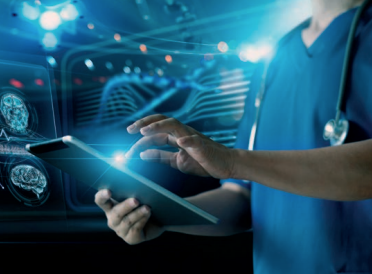Sky's the Limit for ChatGPT Application in Healthcare
February 04, 2023 | Saturday | Views | By Anusha Ashwin
2023 has started with a bang, bringing forth lots of exciting news on the healthcare AI front. The future days are going to be marked by technology interventions that only revolutionise the healthcare and life sciences domain bearing in mind that equity to healthcare services is yet to be addressed and the needle needs to point towards last mile healthcare delivery.
Image credit: shutterstock
The buzz around ChatGPT, the latest generative artificial intelligence (AI) tool is just too overwhelming. The buzz got millions excited in just around a week of its launch, because it seemed like it would gobble up Google — the search engine that this universe practically runs on. This mind-blowing new chatbot technology, ChatGPT, is a large language model trained by San Francisco-based tech company OpenAI.
Why did it grab the world's attention in a short time since its launch? There are several reasons, but the compelling one is that ChatGPT is an uber cool conversational AI tool that offers intelligent, computer-generated conversations. The software application is designed to mimic human-like conversation in response to user queries, which is enabled by superior computing power to perform written tasks. The best feature about chatbots is that they allow interaction in a seemingly ‘intelligent’ human-like conversational manner, where the GPT or the Generative Pre-training Transformer produces the output in a neatly drafted content format. In short, ChatGPT generates responses based on the natural language process inputs.
What can ChatGPT do?
Practically anything under the sun. Well, that might be an exaggeration. However, ChatGPT can spin any kind of written content or design ideas based on a topic or a keyword. It has the ability to translate languages in just seconds, as notably the tool can speak more than 50 languages. What I have understood from social media handles is that ChatGPT is empowered to generate wireframes and build complex python codes. It can turn text-heavy content into simple meaningful passages. Many, in fact, dub ChatGPT as an invaluable teacher, who can simplify explanations to even the toughest math problems that one finds impossible to crack.
So, let me show you an example. I asked ChatGPT, how it is useful in biotechnology and the responses were just mind blowing! Like I said, ChatGPT can summarise complex topics and where market predictors see the future is its ability to make intelligent conversations apart from its ability to contribute in data-backed drug discovery activities. And, as for the fact that it can generate scientific papers, a recent news on ChatGPT being one of 12 authors on a preprint of a medical journal paper has got the regulatory authorities’ heads to turn.
ChatGPT in healthcare
Healthcare service is one of the most customer facing businesses and it has several mundane tasks that consume time as well as other resources. To make healthcare services more sustainable and error-free, ChatGPT is expected to offer assistance in several ways. Conversational AI, as you know, has the potential to revolutionise healthcare administration by streamlining communication, automating tedious tasks, and providing more accurate and efficient processes for both patients and providers. Here is what ChatGPT says it can do to make healthcare services better:
ChatGPT itself states that one of the main benefits of using ChatGPT in healthcare is its ability to improve communication where the natural language processing tool can understand and respond to patient inquiries and concerns, reducing the workload of healthcare providers (who generally spend a significant amount of time answering repetitive patient concerns). Ranging from patient communication to automating back-office operations in healthcare, ChatGPT is going to be a shoulder to lean on as healthcare organisations scale up digitalisation.
On January 10, 2023, Microsoft considered investing $10 billion in OpenAI. This investment by Microsoft is a bid to take on Google’s dominance in the search engine market. Google’s ubiquity has contributed tremendously in providing resources and information related to any industry-agnostic query asked and Microsoft Bing is eyeing a major share of this service.
Google’s counter to ChatGPT
Google Health has been a major contributor to several AI-related developments in healthcare. So, there is no way that Google will not tap Conversational AI and Generative AI tools to offer services and products in the healthcare domain. Countering ChatGPT, Google responded to Open AI’s ChatGPT by announcing its MultiMedQA specifically for answering medical queries. Google Research and DeepMind recently introduced MedPaLM, an open-sourced large language model for medical purposes. MedPaLM provides datasets for multiple-choice questions and for longer responses to questions posed by medical professionals and non-professionals. These comprise the clinical topics datasets for MedQA, MedMCQA, PubMedQA, LiveQA, MedicationQA, and MMLU. In addition, a new dataset of curated, frequently searched medical inquiries called HealthSearchQA was added to improve MultiMedQA.
AI-powered Chatbots to see an upward trend
Accenture estimates that AI applications will cut annual U.S. healthcare costs by $150 billion in 2026. These savings are expected to result from a wider range of AI applications. With chatbots gaining popularity, they are expected to do much more than just chat alongside the potential to combine language skills with image and video recognition. This can be justified by noting Microsoft’s collaboration with Novo Nordisk to develop an AI-based Chinese-speaking chatbot for diabetic patients.
Industry experts predict that the next generation of large language models, like GPT-4, could even be trained in multiple modalities, becoming generalist AI capable of performing a variety of tasks. 2023 has started with a bang, bringing forth lots of exciting news on the healthcare AI front. The future days are going to be marked by technology interventions that only revolutionise the healthcare and life sciences domain bearing in mind that equity to healthcare services is yet to be addressed and the needle needs to point towards last mile healthcare delivery.
Anusha Ashwin









